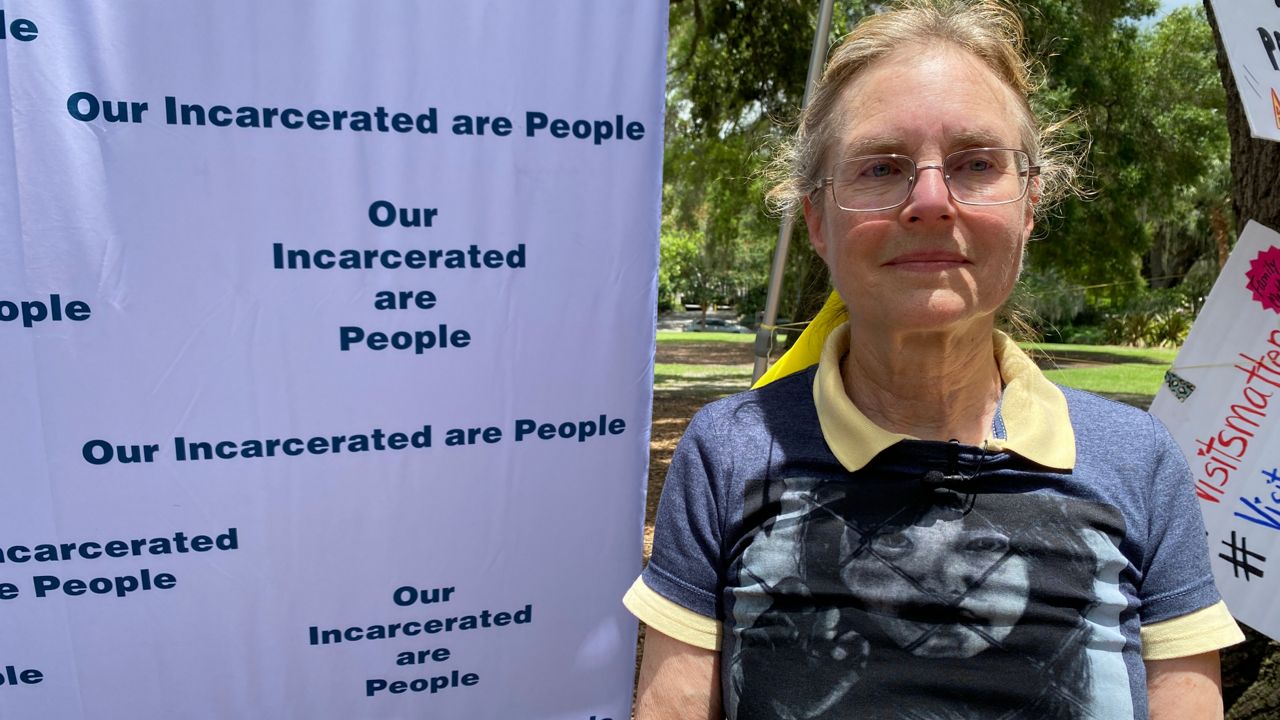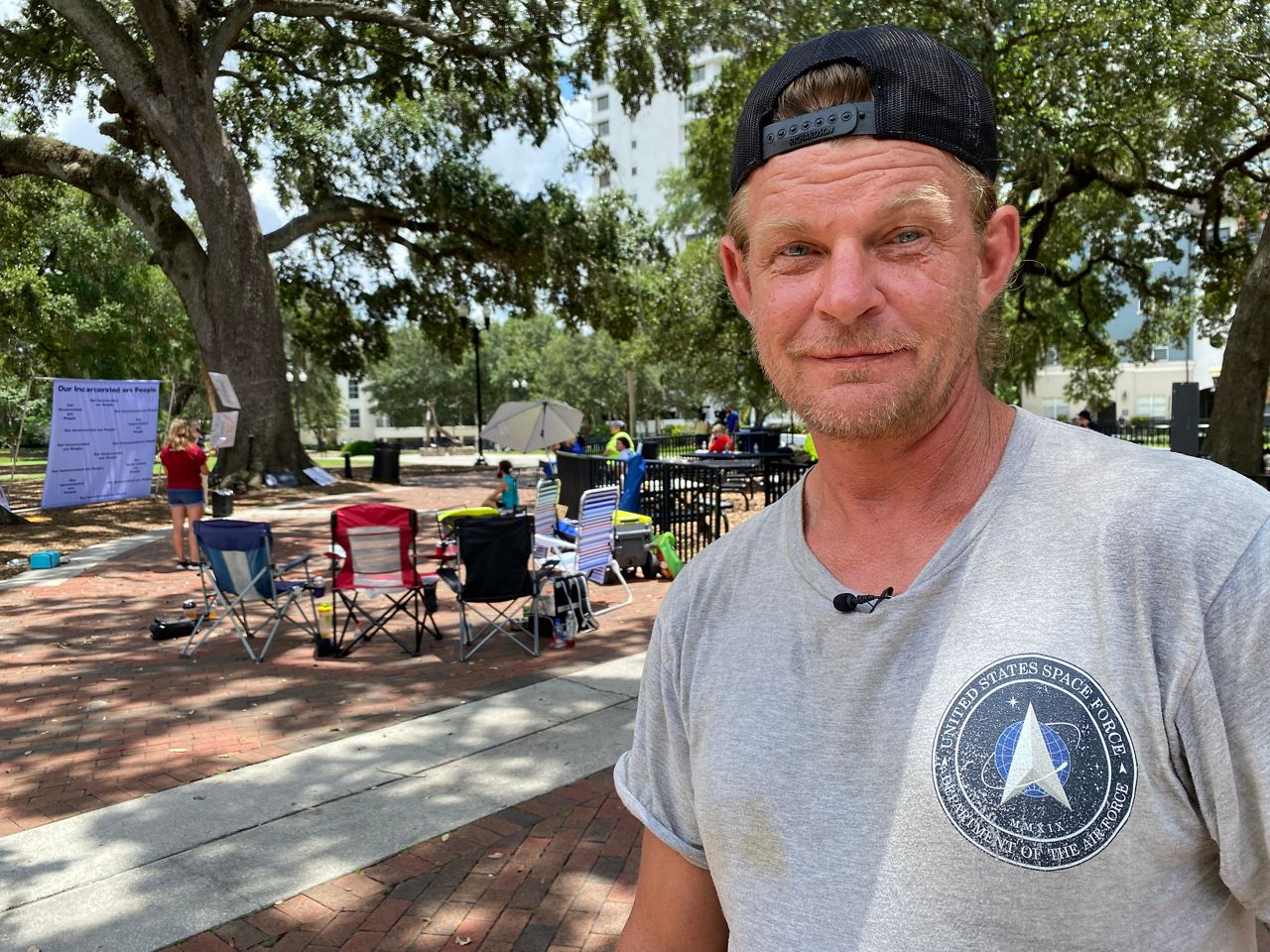ORLANDO, Fla. — Here in Florida in the thick of summer, many of us are just trying to beat the heat.
What You Need To Know
- The Department of Corrections says its newer facilities do have air conditioning, but many of Florida’s current state prisons were designed before A/C was commonplace and don’t have it
- Those gathered at Lake Eola in Orlando said it’s cruel and unusual punishment to force prisoners to live without air conditioning
- Ann Salamone also wants to see the department ensure all inmates have access to cold, running water
But that’s near impossible for a majority of the 80,000 people incarcerated in Florida prison facilities who don’t have air conditioning in their dorms.
Activists and lawmakers gathered Saturday at Orlando’s Lake Eola to push for better living conditions for inmates.
“Agony” is the word former inmate Thomas Fannin used to describe his experience living in a Florida prison during the summertime.
“You work out in the hot sun all day and then you have to go back to the dorm, and it’s like 110 degrees in there,” he said.
Thomas was one of many at Lake Eola pushing for better living conditions for Florida prisoners.
The Florida Department of Corrections acknowledges only about 24 percent of its dorms have air conditioning.
Ann Salamone’s son lives in one of those air conditioned dorms. But last year, he didn’t.

Ann Salamone was one of several people pushing for better conditions for prisoners. Her son has been incarcerated for two years. (Molly Duerig/Spectrum News 13)
Instead, she says, he lived in a dorm without AC, along with 80 to 85 other men.
While Salamone says there were six to eight ventilation fans in that dorm, only one of them worked.
“I think the first thing that could be done, that is not too expensive, and should be done, is to fix all the current ventilation fans that are not working.”
After that, she says, the state Department of Corrections should consider bringing in portable AC units that rely on water evaporation, as a cost-effective solution.
Activists and lawmakers who turned out Saturday weren’t only focused on air conditioning in prisons. They want better living conditions in general, including better food.
And they don’t want the FDC to move forward with its recently-proposed rule change that could cut inmates’ visitation hours in half.

Thomas Fannin was formerly incarcerated in Florida. He attended Saturday's rally at Lake Eola. (Molly Duerig/Spectrum News 13)
“To have that human touch – because we are allowed to give them one hug at the beginning and one hug at the end, and the little kids can actually sit next to their moms or their dads. So that human touch is essential,” Salamone said.
Alexandra Barry agrees. She thinks when prisoners keep strong family ties, it reduces the chance they’ll commit crimes again.
Her reason for coming out Saturday is a bit unique. She said her brother was murdered back in 2016.
But she still wants prisoners to be treated humanely.
“Victimization ends with me and my family,” Barry said. “And I want to have more humane conditions for not just the officers, but also the incarcerated, because when we have this excruciating heat, it creates violence and my goal is to help end violence.”
As a former prisoner himself who witnessed heat triggering violence between inmates, Fannin agrees.
“It would calm people down if it was cold or cool, you know what I mean? It would calm people down.”
The Florida Department of Corrections’ proposed rule to limit visitation hours is currently still in the development stage.
Once the exact language for the rule is nailed down, it’ll move to the next phase, which is when citizens can request a public hearing. Activists tell us they intend to request such a public hearing.
U.S. Rep. Charlie Crist, who is running for governor, sent Spectrum News 13 a statement on Saturday that said: “The lack of air conditioning in our state prisons is cruel and inhumane. As Governor, I will work to correct this flaw in our judicial system."
Florida's Department of Corrections says its proposed visitation change is currently in the rule development phase, and public comments about it are being accepted. You can submit a public comment here: FDCRuleCorrespondence@fdc.myflorida.com.
The rule development process can last for an undefined length of time, the agency says, until it files a notice of proposed rulemaking. At that point, activists tell us they plan to request a public hearing on the matter.
You can check for status updates here: Florida Department of Corrections -- Office of the General Counsel (myflorida.com)


